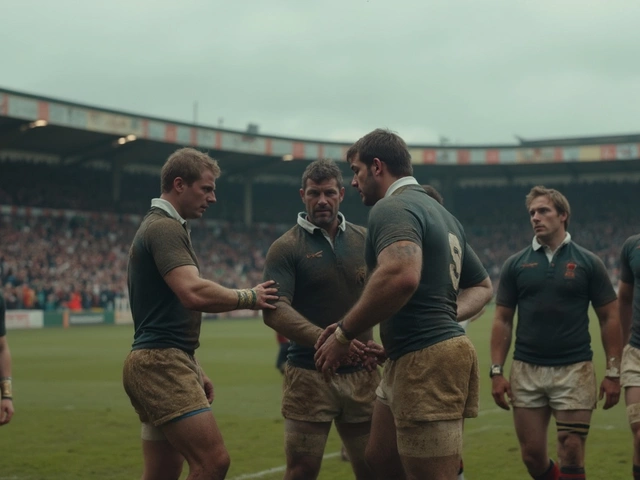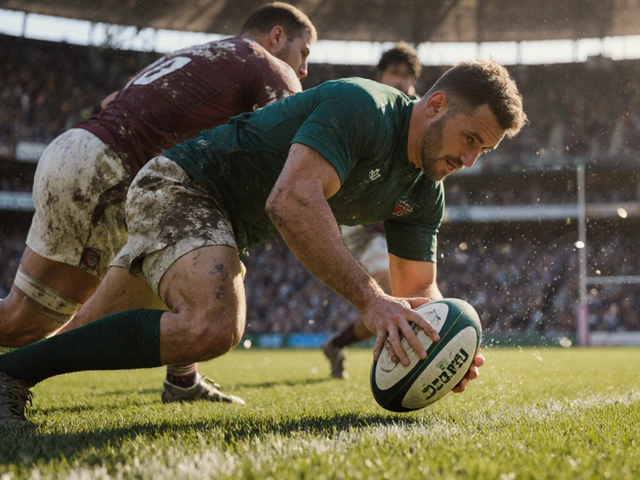Rugby Slang: The Lingo Every Fan Should Know
Hard to feel left out when everyone around you is throwing words like "sin bin" or "up the guts" and you’re still figuring out what try means. Rugby isn’t just hard-hitting tackles and muddy boots; it’s got a language all of its own. And this isn’t just to sound cool—rugby slang is shorthand for everything, from crazy plays to heated fixtures. If you want to join the conversation or just not look lost during game night, knowing the slang is your golden ticket.
Even rugby newcomers pick up a few bits pretty quickly. For example, after a few matches, you’ll know that "pack" isn’t about lunches, and "scrum-half" isn’t some weird haircut. This lingo flies around like passes on the pitch, and it brings fans together. Gear up, because understanding the slang can make fixtures not just exciting, but actually make sense.
- Why Rugby Has Its Own Slang
- Rugby Basics: Terms New Fans Hear First
- Fan Talk: Banter and Nicknames
- On-Field Shouts and Player Lingo
- Fixture Day Slang: Stadium and Pub
- Using Rugby Slang Like a Pro
Why Rugby Has Its Own Slang
Rugby didn’t just make up random words for fun. The sport is fast-paced, brutal, and packed with team banter, so it needed quick ways for players and fans to talk about the action. Over 180 years ago, kids in England were already inventing short, funny phrases while playing. Those words stuck. Now, you’ll hear them at every club, in every country where the game’s played.
Some slang lets teams organize in a split second—"ruck" and "maul" tell you exactly what’s happening without wasting time. And because rugby culture is all about tradition and brotherhood, people use the old terms proudly—especially in places where rugby is like a religion, like New Zealand, South Africa, or Wales.
Here’s how rugby slang makes life easier on and off the field:
- Speeds up on-field communication when play is chaotic
- Lets fans and players quickly bond—if you know the words, you’re part of the club
- Makes match commentary way more colorful and memorable
- Keeps old traditions alive from generation to generation
Want some proof rugby’s lingo has gone global? Check this out—more than 8 million people play organized rugby worldwide, creating loads of local twists on classic terms. Here’s a quick comparison of rugby slang from different countries:
| Country | Slang Example | Meaning |
|---|---|---|
| England | Biscuit tin | The area behind the posts (the "danger zone") |
| New Zealand | Mullet | Rugged forward (player with a particular hairstyle) |
| South Africa | Bok | Nickname for a Springbok player |
| Australia | Galah | Loud or showy player |
Once you start using rugby slang, you’ll notice that even the casual chats and fixture banter get a lot more fun. It’s not just about words; it’s about being part of the rugby family, wherever you are.
Rugby Basics: Terms New Fans Hear First
Stepping into the world of rugby, you’re going to hear the basics tossed around before every rugby slang term even gets started. These are the bread and butter words that pop up in every match, on every fixture list, and in every highlight.
Let’s break down the ones you’ll bump into right away:
- Try: The big goal of rugby. Touch the ball down in the opponents’ in-goal area, and you get 5 points. No fancy celebration required, just cross that line.
- Conversion: After a try, you can kick for 2 more points. It’s a bit like a bonus round but much harder – you’ve got to kick the ball through those tall posts.
- Scrum: Watch for that moment when the forwards from both sides pack together and shove for possession after a minor infraction. It’s rough, but totally legal.
- Lineout: When the ball’s been kicked or carried out of bounds, teams line up, jump, and try to snatch the ball when it’s thrown back in. Looks a bit ridiculous, but it’s strategic.
- Ruck: It’s the messy pileup after a tackle, when players try to keep or steal possession without using their hands.
- Maul: Sort of like a moving ruck. Ball carrier stays on their feet, both teams try to drive him along, and everyone piles in behind.
Heard a match commentator say, "He’s off to the sin bin!"? That’s a ten-minute time out for rough play or breaking the rules, and teams hate going a man down. The "fullback" is the player hanging out in the very back fielding kicks, while the "fly-half" often calls the shots and controls how plays unfold.
"Rugby terminology might sound confusing at first, but once you follow a few matches, all those words start to click," says Brian Moore, former England international and current BBC rugby analyst.
For some context, here’s what you’re most likely to hear, see, and shout in a typical fixture:
| Term | What It Means | Points (if applicable) |
|---|---|---|
| Try | Grounding the ball in the in-goal area | 5 |
| Conversion | Kicking the ball through posts after a try | 2 |
| Penalty Kick | Kicking for points after an opponent’s foul | 3 |
| Drop Goal | Drop-kicking for points in open play | 3 |
| Scrum | Restart with forwards pushing for the ball | - |
| Lineout | Ball thrown in after it goes out of bounds | - |
These terms are shouted all over stadiums and bars, so knowing them makes keeping up with the action way easier. The more games you watch, and the more you listen, the quicker this all becomes second nature. Don’t stress if you miss a few at first—rugby talk always gets easier the more you’re around it.
Fan Talk: Banter and Nicknames
Spend time with serious rugby fans and the first thing you’ll notice is the banter flying around. Most of it is full of good humor—even when it sounds harsh to outsiders. Fans use rugby slang to tag rival teams, their own favorite players, and even the refs. Some of it’s regional, some universal, but all of it helps turn fixtures into something memorable.
Let’s look at how fans turn names into inside jokes. England’s rugby team is called the “Red Roses” if you follow the women’s game, while the men get called the “Old Enemy” by the Welsh. Australians become the “Wallabies,” New Zealand fans shout for the “All Blacks,” and South Africa’s team goes by “Springboks.” Even Ireland gets shortened to the “Boys in Green.” These nicknames show up in chants, online forums, and conversations in the stands. They break the ice fast.
It’s not just teams getting the treatment—players too. Fans call their stars by nicknames like “Billy V” for Billy Vunipola, “BOD” for Brian O’Driscoll, or “The Beast” for Tendai Mtawarira. Sometimes it’s about a playing style or just their initials. Other times, it’s an inside joke everyone in the fan group gets.
And then there’s the good-natured stick fans give the opposition. If a team is all defense, someone might call them “bus parkers.” A sneaky winger gets called a “speedster” or a “flyer.” A player with a bad habit of dropping the ball is the group’s “butterfingers.” One famous bit of banter in Six Nations circles is calling the French “Les Bleus”—a sign of rivalry, but hardly ever actual malice.
If you’re new to a club or a rugby pub, listen in before you start using nicknames—some are shared by millions, others are private jokes within a small crew. But once you pick them up, you’re in on the fun. Banter is how rugby fans show passion, loyalty, and a sense of humor, even on days when their team takes a beating.

On-Field Shouts and Player Lingo
The stuff players yell at each other during a match? It’s not random shouting—this is code, and knowing it totally changes how you watch a fixture. On any given day, you’ll hear things like 'crash ball', 'wrap around', or 'off your feet'. Each term has its place on the field, giving fast instructions without wasting time.
Take 'crash ball', for example—that’s when a big player smashes right through the defensive line. No fancy footwork, just straight-up muscle. Then there's 'dummy', where a player pretends to pass but keeps the ball. 'Scrum' isn't just a pile of bodies, it's a set move to restart the game. You’ll often catch the scrum-half shouting 'bind!' or 'engage!' to get everyone set.
Some of the most-used player lingo includes:
- Rugby slang: Quick code for the whole team (and crowd) to use. 'Garryowen' is a high kick, 'lineout' means the ball went out and gets thrown back in, 'sin bin' is the penalty box.
- 'Jackal': When a player goes for the ball right after the tackle, trying to win a turnover. 'Jackaling' has become huge since new breakdown rules popped up a few years ago.
- 'Offload': Passing the ball to a teammate while being tackled. French teams are crazy for this move, and you’ll see tons of highlight reels showing flashy offloads.
- 'Numbers out wide': Basically, telling teammates there are open players on the wing, so swing the ball out quick.
And yeah, there are inside jokes too. 'Hospital pass' isn’t great news for the player catching it—it means the pass sets them up to get flattened. 'Meat pie' in Australia means scoring a try. Want to call for support? Yell 'with me!' or 'on your right!'.
If you look at game stats, you’ll see just how key this chatter is. Here’s some real data from a 2023 Six Nations match:
| Shout | Average Uses per Match |
|---|---|
| Crash ball | 14 |
| Numbers out wide | 8 |
| Jackal | 6 |
| Offload | 11 |
All these shouts create instant connection on the pitch. Even fans in the stands—or watching fixtures at home—pick up on it fast. Once you know the basics, you can follow the action way better and feel part of the squad, whether you're shouting along or just decoding what happens in the heat of the match.
Fixture Day Slang: Stadium and Pub
There’s nothing like the chaos and noise of a live rugby fixture, whether you’re squeezed into the stands or shouting at the telly in your local pub. On match day, rugby slang takes on a life of its own. Everyone from old-school fans to first-timers joins in, turning the air into a mix of cheers, groans, and quick-fire talk you might not catch at first if you’re not prepared.
One of the biggest things you’ll notice is the way fans address the teams and players. Nicknames like "scrummers" for forwards or "backs" for the speedy players are everywhere. You’ll hear “Come on lads, give it some welly!” or “That was a hospital pass,” meaning a dangerous play that sets your mate up to get flattened. The word "fixture" (the most important rugby slang phrase for today’s topic) pops up before and after the match, since it’s rugby’s way of saying which teams are squaring off.
Down the pub, fans debate calls and relive every try over a pint. If someone says “That ref needs glasses!” or “They bottled it in the last ten,” you’re in the heart of rugby banter. “Bottle” means to lose confidence at a key moment. "Line-out" and "maul" aren’t just strategies—they spill into pub talk, used to break down the day’s big moments. Even beer has its rugby slang: “scrumming pints” means drinking hard and fast with your crew before heading off, or “post-match pint” to ease the nerves after a wild finish.
Here’s a quick data snapshot that shows just how attached rugby fans are to their slang-filled routines:
| Slang Phrase | Where You’ll Hear It | What It Means |
|---|---|---|
| Give it some welly | Stands, pub | Put real effort in |
| Sin bin | Commentary, pub chat | Time-out for a penalty |
| On the lash | Pub | Drinking (usually celebrating or commiserating) |
| Hospital pass | Game recap, pub stories | A risky pass likely to get the receiver tackled hard |
| Up the guts | Stadium cheers | Charging forward through the middle of the opposition |
If you want to blend in on fixture day, pick up a few of these, and you’ll sound like you’ve been part of the scene for years. Just remember: rugby slang’s all about the culture, the laughs, and making every match a proper event—whether you’re pitchside or trading banter at the bar.
Using Rugby Slang Like a Pro
If you really want to blend in, you’ve got to drop the right rugby slang at just the right moments. It’s not about trying too hard—it’s about sounding like you know the game even if you’re only halfway following the fixture list. Throw out a word or two and you’ll instantly seem like you’ve watched more than just highlights on YouTube.
Let’s get practical. First, watch a live game with the sound up. Listen to what players, refs, and fans are saying—phrases like "knock-on," "gassed," or "dummy pass" come up all the time. Next, try using these in a conversation about a recent match. The more you actually use the lingo, the easier it sticks. Practice is the real secret here.
- At the pub? If a player gets sent off, say, “Straight to the sin bin!”
- See a big collision? “He just got absolutely smashed!”
- Noticing a sneaky play? “Did you see that dummy?”
- When your team wins a muddy game, “That was a proper slog!”
One cool fact: researchers from Loughborough University found that sports fans who use team-specific slang feel more connected at matches and even experience higher levels of group pride. You’ll hear these terms fly in stadium chants, on rugby forums, and at after-game meetups.
If you’re curious how much this stuff matters, check out this bit of trivia: English Premiership fans use about twelve different slang words per half during a typical fixture—mostly to rib refs and hype up teammates.
| Slang Term | What It Means | When To Use It |
|---|---|---|
| Garbage Time | End of the game, when result is clear | When the score is way one-sided |
| Hospital Pass | A risky pass that could get a teammate tackled hard | When you see a player force a bad handoff |
| Up the Guts | Running straight through the middle | When forwards crash through the defense |
| Meat Pie | Scoring a try | Celebrate a try—"He got a meat pie!" |
One more tip: don’t be afraid to ask what something means. Most fans love sharing their favorite phrases and might even teach you a new one. The quickest way to sound natural is to pay attention, use the terms, and just join in. You’ll go from rookie to regular in no time.









